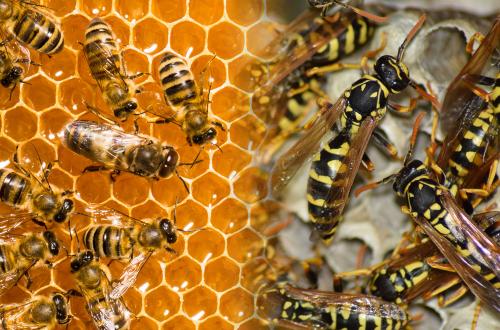Is Humane Bee and Wasp Control Possible?

It is inevitable that some of us would find bees and wasps as a nuisance especially when they establish their nesting places in certain areas of our home or garden where humans usually dwell. Another thing about wasps and bees, particularly the “social type”, is their tendency to be defensive and so they attack people. This unpleasant encounter with bees and wasps is one reason we want to avoid them or dispose of them as much as possible. However, what we need to keep in mind is the fact that these creatures do not just sting for no reason. They only become defensive if they feel like their nest or colony is being disturbed or threatened. Otherwise, they would just leave you alone and do you no harm.
It is widely known that bees and wasps are nature’s best pollinators, thereby positively contributing to our ecosystem. In fact, agriculturists strongly promote the preservation of honeybees not only because they are a great source of honey but also because they help greatly in the growth and prosperity of crops. Aside from this, certain types of wasps are beneficial to your garden because they actually help control certain lawn devastating pests like grubs, caterpillars, and other beetle larvae. It is for this very reason that killing bees and wasps is seen as cruel. Bee and wasp control must be done only by using humane methods, which is definitely possible.
There is no need for homeowners to resort to harsh means of pest control such as using chemicals or pesticides to get rid of bees and wasps. If you want to keep these stinging insects from building their colonies within your home premises, you can employ humane and natural ways by doing the following:
Using herbs
This is one way to repel wasps because wasps despise the aroma of herbs such as eucalyptus, thyme, spearmint, and citronella. You can simply grow herbs in your garden and outdoor spaces and keep wasps at bay.
Setting up a bogus nest.
Wasps are territorial by nature; hence, they do not appreciate seeing other nests built near their own. You can trick the wasps by placing a fake nest a few meters from their nest. They will surely leave those areas they believe are already occupied by other wasps.
Doing preventive measures such as:
Not wearing strong scents or perfumes.
Bees and wasps are usually attracted to sweet-smelling fragrances. If you desire to avoid these creatures, then be smart enough to avoid using perfumes.
Not wearing bright colored, especially white and yellow, apparel.
Clothes with floral patterns and bright colors also captivate bees and wasps as they will think of you or your clothes as flowers. Experts suggest wearing red instead whenever you are in the yard or in places dominated by these insects.
Taking away food sources
Foods that are rich in sugar and protein are known to catch the attention of wasps. It is therefore a sensible move to remove all food sources by covering or sealing food containers as well as garbage cans tightly. You can also keep your surroundings free from fallen fruits, left over food, and other food debris.
Sealing entry points
One of the best things to do to keep bees and wasps from entering your home is to close up all potential entry points for these insects. Carefully check your household for any cracks or openings around doors and windows, ripped screens, open vents, etc.
Not swatting or agitating the insects
What really provokes bees and wasps to attack and turn aggressive is being agitated. Swatting these insects whenever they get near you is never a good idea. Don’t you know that bees and wasps release chemicals called “pheromones” whenever they are threatened or injured? This chemical alerts the others in their colony to attack and defend their comrades. A piece of advice: Stay put and relaxed every time a bee or wasp gets near you. Instead of panicking or hurting them, it is best to simply walk away slowly and they will in turn leave you in peace.
Wasps and bees, just like the rest of God’s creations, exist to survive. Since they are generally good for the environment, these insects need not be exterminated by killing them through traps and chemicals. As mentioned above, there are many natural and nontoxic ways to prevent them from dwelling in your garden and home. If you really want to have their nests removed for good, you may do so through the help of professionals who will simply remove and relocate the nests. For instance, local beekeepers can be of great assistance when removing bees’ nests without necessarily harming the bees.
Post Your Ad Here
Comments